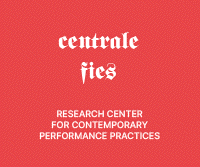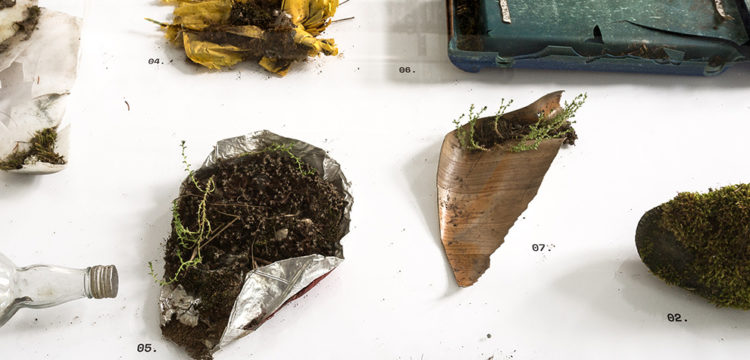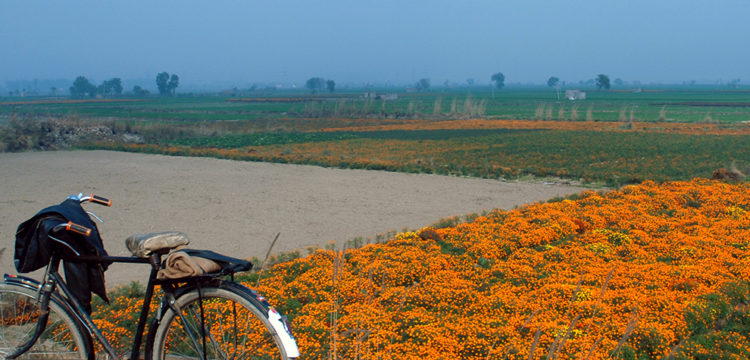No Sun Nor Sea
We are all on the same shore, and this shore is a theatre
Currently on view at Teatro Argentina in Rome, Sun&Sea is an opera-performance by Rugilė Barzdžiukaitė, Vaiva Grainytė and Lina Lapelytė, curated by Lucia Pietroiusti. Presented as Sun & Sea (Marina), the piece was awarded the prestigious Golden Lion for Best National Participation at the 58th Venice Biennale in 2019.
As I sat down at Teatro Argentina, I felt I already had an idea about what I was going to see. After the success at the Venice biennale, Sun&Sea became a sensation. I remember having to be careful to not look at any video reposted on social media, or to not read any review that could spoil the surprise of seeing it in person. Some images went viral. But when I sat down, I felt somehow part of that meaningful backdrop—of a classical theater all’italiana where the parterre in this case becomes the stage, and the balconies offer a higher privileged point of view, although—I must say—there’s no actual separation between the inside or the outside, because in this shore of the late Anthropocene, we and the theatre are the sky and the sea that surrounds the beach where the action unfolds.
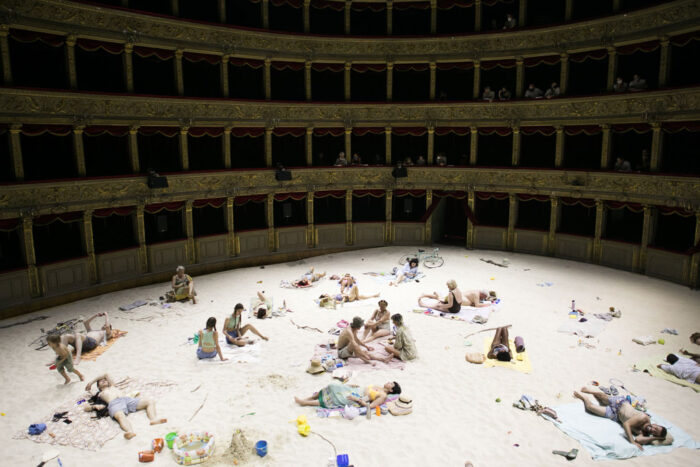
We are inside the minds of the singers, we are extras ourselves, we witness without being able to amplify, until we leave the theater we belong to this representation. We know we are complicitly part of the issue. And this backdrop of a classical theatre exaggerates this feeling tremendously. Once I went to a lecture by Bruno Latour and the sentence I remember the most was something like—we could speak of our current climate crisis and our reaction to it, as if I would tell you that this very theatre is burning and all of you would remain seated. All this considered, I am glad I’ve experienced this work with this backdrop. It’s quite uncanny to smell the sunscreen in such a location. It is quite special to feel so submerged in a piece, to feel entitled to whisper, to look at our phones and chill in the theater, as if we were actually on a shore, as alienating as that sounds.
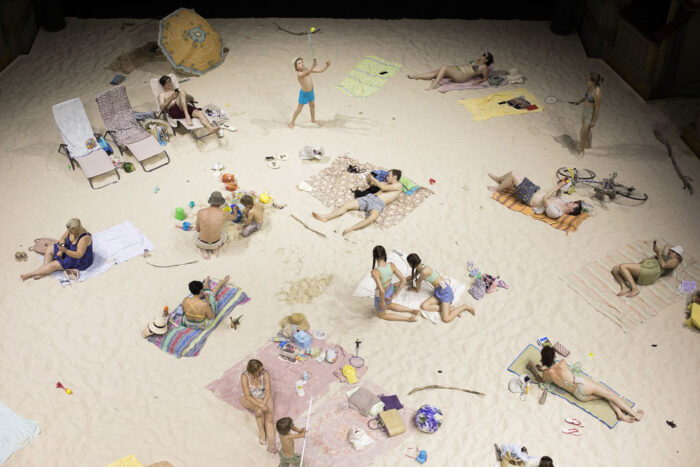
We say being on the same boat, but this particular boat reached the shore, and that’s where we all are, sunbathing and singing at the verge of the end of the world. What does it mean then, when this shore is a theatre? A whole other set of implications are added into a more typical alienation linked to representation. Each character brings some about, in their stereotypical baggage of hardship. The sea is absent, and the sun is unnatural. We’re coming from an outside where the June sun is steaming hot, bodies are sweating and every surface that is touched by the sun is ablaze. We enter this inside with some sense of relief triggered by this clear separation between the factual and the staged. Yet, we sit and we recognize moves and thoughts, we smile via empathy and begin to play the exciting game of finding meaningful details within what’s actually staged. One of my favorite was surely the grandma playing with her grandson, passing a deflated balloon to them—by no coincidence that balloon is the blue marble, Gaia, the planet Earth depicted as a satellite view (google earth vs a globe). Through this intergenerational bouncing the ball gets so soft, that the grandma eventually uses it as a pillow to sunbathe, and well the metaphor is so already well served, that there’s not much I can add. Beside the usual alienation of representation, indeed there’s a planet dying. There is a generation who’s leaving behind a damaged environment (literally chilling over what remains of it), and another that feels deprived of a future, thus is already accustomed to speak about reparation. The youngest kids on this shore don’t know yet, they’re still busy playing or satisfying their mum’s weirdly regretless aspirations—
“My boy is eight and a half
And he has been swimming in
The Black,
The Yellow,
The White,
The Red,
The Mediterranean,
Aegean seas…
He has already visited two of the world’s great oceans,
And we’ll visit the remaining ones this year!”—Vaiva Grainytė
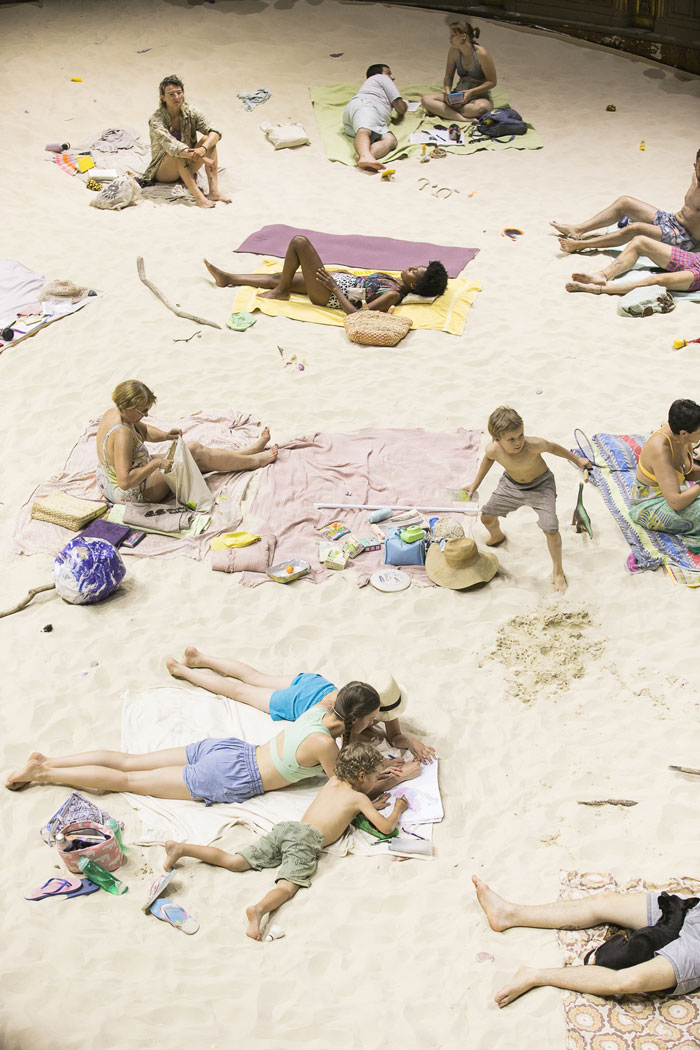
The teenagers twins though are mourning, meaning they already experienced the limit of it all. They know a before and a after, they are aware that some things will die before their eyes, and no 3D printer will bring them back, despite their mum’s reassurances—“My mother left a 3D printer turned on. And the machine began to print me out.” After the scene where the new generation cries the genocide out loud, in a future world which will be either 3d printed or not at all, the old woman is busy with saving her own skin with some solar cream. We can dive into this diversity of dramaturgical details, I know I didn’t yet notice them all, which makes me want to return and watch more, in an eerie voyeuristic position this piece is placing me in. I am inside someone’s head, I am at the beach, but I hear everyone’s thoughts as superficial as they may be, they are legitimately various in depth, but the fact that I am hearing them makes me feel like—again—we’re in this all together—somehow, we share similar thoughts with more or less poetic approaches. I am not simply a witness, I am part of the problem.
“The colors of the sea and sky have changed” but it feels as if we didn’t even notice that, or maybe we did and weren’t able to act accordingly. Each of these singing characters are adding some nuances to this macabre scenario of inaptitude, information and feelings are delivered as if they were gossip, belonging to that very specific category related to summer, speaking of traveling, sea, work fatigue, weather, heat, skin products and so forth, mixed with some very personal anecdotes. In Italian, we would indeed call it gossip da spiaggia, namely “beach gossip”, we either practice it ourselves or we hear it, willingly or not, we know all about it.
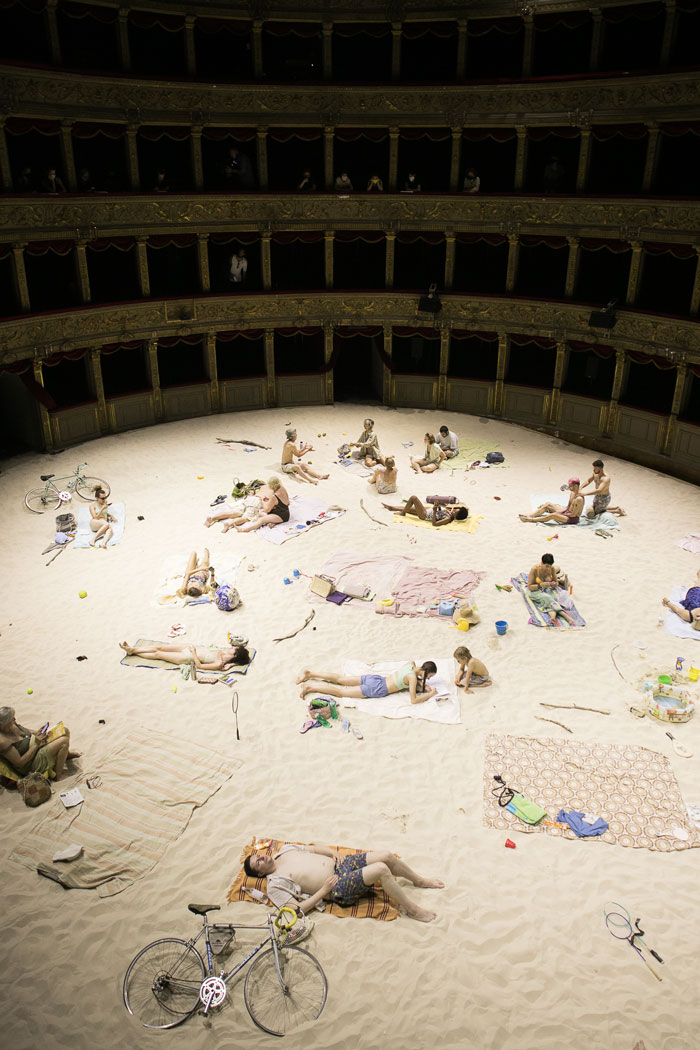
We momentarily forget about being in a theater, since we’re too busy remembering what it means to absorb information through this accidental proximity. This fortuity increases the estrangement, so much so that the lyrics appear to be banal in the start. As banal as a casual summer thought. As we dive deeper into everyone’s story (I must admit even after leaving the theatre, rereading the libretto by Vaiva Grainytė is definitely a renewed layered experience) we understand that no detail is casual, at all, and no voice is banal, because it carries the load of a multitude—that is what the representational stereotype does, it speaks on behalf of a category. Here we have, just to name a few: the middle aged man who’s living for working and is frustrated and tired; the wealthy mum who only thinks about her prestigious holiday; the long-distance relationship which has to consume loads of carbon footprints in order to exist; the lonely lady who thinks about her ex; the other one who constantly complains about other people’s behavior; the “philosopher” kind of person who always comes with some ethical prescriptions; all of these merging in a collective depressing choir of vacationers.
“THIS YEAR THE SEA IS AS GREEN
AS A FOREST:
EUTROPHICATION!
BOTANICAL GARDENS ARE FLOURISHING IN
THE SEA—
THE WATER BLOOMS.
OUR BODIES ARE COVERED WITH A SLIPPERY
GREEN FLEECE,
OUR SWIMSUITS ARE FILLING UP WITH ALGAE,
EMPTY SNAIL HOMES, SWOLLEN SEAWEED,
FISH REMAINS,
AND ALL KINDS OF SHELLS…”—Vaiva Grainytė
By coincidence, I went to a real beach the day after. This is one of those works which are meant to stick to your imagination and become amplified outside the place where the representation takes place, and if there’s any realistic intent, this is where it succeeds—in leading the alienation outside the theatre, in making us feel part of something bigger, in increasing our skin sensitivity toward a temperature that’s rising. In breaking any kind of separation between representation and reality, individual and collective, inside and outside, us and them, the natural and the human.



